|
Seventh
Conference of the Parties to the UN Framework Convention on
Climate Change Marrakesh, Morocco 29 October to 9 November 2001 |
|||||
|
||||||
|
|
||||||
|
Highlights for Wednesday, 31 October 2001
Delegates to the Seventh Conference of the Parties to the
UNFCCC met in the SBSTA to consider UNFCCC Article 6 (education, training
and public awareness), activities implemented jointly (AIJ), and other
matters. Negotiating groups on compliance and Protocol Articles 5
(methodological issues), 7 (communication of information) and 8 (review of
information) continued their work. In addition, informal consultations
were held on LDCs, the CDM, JI, the Consultative Group of Experts (CGE) on
non-Annex I communications, late payments of contributions to the UNFCCC,
and a letter from the Central Asia, Caucasus and Moldova Group on their
Status under the UNFCCC. |
|
|
||
|
SBSTA: UNFCCC ARTICLE 6 |
||
| On Article 6, MALAYSIA and CHINA stressed the importance of a concrete implementation work programme. The US suggested that a workshop be held on the prioritization of activities and on setting a work programme. | ||
| ACTIVITIES IMPLEMENTED JOINTLY: | ||
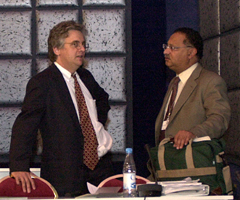 On the fifth synthesis report of AIJ under the pilot phase, the US provided proposals aimed at capturing the ongoing review of the pilot phase through continuing annual reports, revisiting elements for improvements, and looking at host party experiences of the pilot phase. Left photo: Delegates from the US and Saudi Arabia |
||
| OTHER MATTERS: | ||
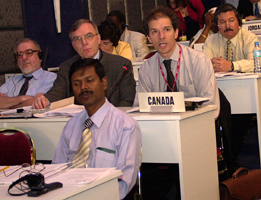 CANADA
(right) reported on a recent meeting in Calgary on the "cleaner or less
greenhouse-gas-emitting energy trade," highlighting, inter alia,
conclusions that: optimal uptake of cleaner or less greenhouse-gas-emitting
energy depends not only on domestic emissions reduction strategies, but also
on international trade; and that such trade under the Protocol could
encounter significant barriers limiting emission reduction opportunities and
could even lead to increased emissions. Supported by many other Parties, he
proposed a follow-up workshop on methodological issues. CANADA
(right) reported on a recent meeting in Calgary on the "cleaner or less
greenhouse-gas-emitting energy trade," highlighting, inter alia,
conclusions that: optimal uptake of cleaner or less greenhouse-gas-emitting
energy depends not only on domestic emissions reduction strategies, but also
on international trade; and that such trade under the Protocol could
encounter significant barriers limiting emission reduction opportunities and
could even lead to increased emissions. Supported by many other Parties, he
proposed a follow-up workshop on methodological issues.
|
||
|
|
||
| NEGOTIATING GROUPS: | ||
| PROTOCOL ARTICLES 5, 7 AND 8: | ||
| The negotiating group on Articles 5, 7 and 8 took up the draft guidelines for the preparation of the information required under Article 7. On the reporting of supplementary information under Article 7.2 (inclusion of supplementary information in national communications), delegates disagreed over whether Parties should be "required" or "requested" to provide information on the use of mechanisms to supplement domestic action. | ||
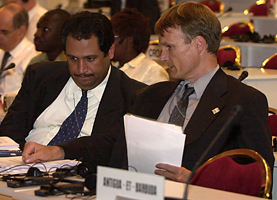 SAUDI
ARABIA proposed introducing additional subparagraphs requiring Parties to
submit information on, inter alia, how the reported activities
exclude carbon dioxide removals due to indirect human-induced effects. Right photo L-R: Delegate from Saudi Arabia in
consultation with Germany. SAUDI
ARABIA proposed introducing additional subparagraphs requiring Parties to
submit information on, inter alia, how the reported activities
exclude carbon dioxide removals due to indirect human-induced effects. Right photo L-R: Delegate from Saudi Arabia in
consultation with Germany.
|
||
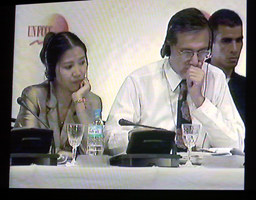 The
Secretariat presented an analysis on the matter based on Parties 2000/2001
submissions of national reports. He noted that the thresholds proposed in
the draft would ensure that major source categories and the sums of many
small adjustments are not omitted, The
Secretariat presented an analysis on the matter based on Parties 2000/2001
submissions of national reports. He noted that the thresholds proposed in
the draft would ensure that major source categories and the sums of many
small adjustments are not omitted,
|
||
| COMPLIANCE: | ||
| On submissions, AUSTRALIA (above), supported by the RUSSIAN FEDERATION, and opposed by a number of Parties, suggested the deletion of the possibility for a Party to submit a question of implementation with respect to another Party, explaining that it had the potential to create rifts among Parties or could eventually be used by a Party for "other reasons" and that the reports from expert review teams (ERTs) provided a thorough triggering process. | ||
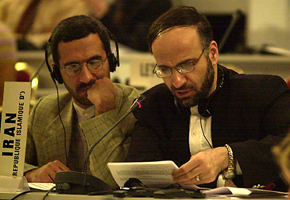 The EU highlighted that the Party-to-Party triggering option was useful for the effectiveness and balance of the compliance procedures. With IRAN (left), he said that if questions could be indicated in the reports of ERTs, sovereign states should also have the possibility to make submissions against another Party. |
||
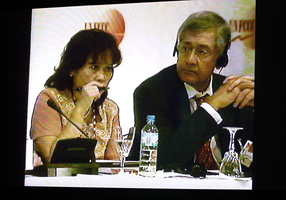 SAMOA stressed that procedures are non-adversarial, multilateral in nature and include due-process provisions. Left photo: Co-Chair Neroni Slade and the Secretariat during a session on Compliance. |
||

|
||
| JAPAN, opposed by CHINA, suggested that triggering against another Party could be limited to the facilitative branch. | ||
|
|
||
| FOSSIL OF THE DAY: | ||
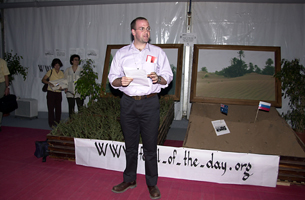
|
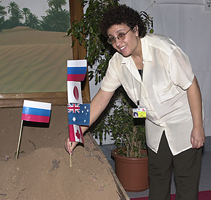 The fossil of the day is presented by the
Climate Action Network (CAN) to countries that have stymied the negotiation
proocess. For more information visit the Fossil
of the Day Awards on the internet. The fossil of the day is presented by the
Climate Action Network (CAN) to countries that have stymied the negotiation
proocess. For more information visit the Fossil
of the Day Awards on the internet.
|
|
| |
||
|
|
||
|
|
|
|
| © 2001, IISD. All rights reserved. |
|
|








